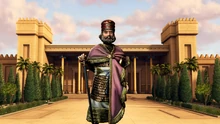Mursilis and Nabopolassar

“Nebuchednezzar Syndrome”:
dreams, illness-madness, Egyptophobia
by
Damien F. Mackey
“Inside my mouth the word became scarce, and the word came out somewhat stumbling. And the years came and went and this condition began to play
a part in my dreams. And god’s hand struck me in the time of a dream,
and the ability of speech I lost entirely”.
Mursilis
Lately, in the course of this series, I arrived at the conclusion that the Babylonian king, Nabopolassar (c. 626 - 605 BC, conventional dating), thought to have been the father of Nebuchednezzar ‘the Great’ (c. 605 BC - c. 562 BC, conventional dating), needed to be listed amongst the other “Nebuchednezzar Syndrome” types, indeed as Nebuchednezzar himself.
Now, I had completely forgotten over the years that Dr. Immanuel Velikovsky had proposed, in his controversial book Ramses II and His Time (1978), to identify this Nabopolassar with Mursilis – though logically this had to be the case, given Dr. Velikovsky’s thesis that Nabopolassar’s presumed son, Nebuchednezzar, was Hattusilis, the presumed son of Mursilis.
Most interestingly now, I find, from re-reading Velikovsky (and others) on this subject, that Mursilis, too - {and Nabopolassar} - had suffered a shocking Nebuchednezzar-like illness.
Velikovsky begins proceedings by bravely attempting to connect, linguistically, the seemingly (at face value, anyway) different names, “Nabopolassar” and “Mursilis” (p. 107):
…. cuneiform can be read both ideographically and syllabically, and thus “Nergil” (Nergal) could become “Muwatallis.”—
For these reasons it is not surprising that Greek authors called Nabopolassar “Belesys” (Diodorus, II, 24) and “Bussalossor” (Abydenus), and that in the Boghazkoi texts he is called “Mursilis” and “Bijasili”, in Egyptian Merosar”, in Babylonian “Bel-shum-ishkun” and “Nabopolassar”. As was brought out in
preceding pages, Hattusilis was a Chaldean name of the king who is variously named Nebuchadnezzar and Nebuchadrezzar in the Scriptures, the name he himself preferred upon having achieved great fame as the builder of Babylon, under the aegis of Nebo, the protector god of his father and of the city the father conquered and the on built. ….
But it is what then follows that I find to be most intriguing in the context of this present series on “Nebuchednezzar Syndrome”.
Velikovsky - here following a very late source, “Berosus” (var. Berossus), it should be noted - writes (pp. 107-108):
Nabopolassar Becomes an Invalid
Berosus, the Babylonian historian, writing in Greek about events three and four centuries earlier, recorded the succession of the kings of the Neo-Babylonian Empire and described how Nabopolassar became sick, and “being himself unequal to the fatigues of a campaign, committed part of his army to his son Nebuchadnezzar,” and how Nebuchadnezzar subdued the rebellious provinces.— “Meanwhile, as it happened, his father Nabopolassar sickened and died in the city of Babylon, after a reign of twenty-one years.”
Nabopolassar, the indefatigable warrior, when he first became stricken by illness, had to relinquish his post at the head of his army; later the state of his health worsened for a second time and he died.
The archives of Boghazkoi have preserved the authentic story of the illness of Mursilis, father of Hattusilis.
1 was on the road to Til-Kunnu. Stormy weather broke loose, the god of Storm did thunder dreadfully. Inside my mouth the word became scarce, and the word came out somewhat stumbling.
And the years came and went and this condition began to play a part in my dreams. And god’s hand struck me in the time of a dream, and the ability of speech I lost entirely.—
The king was crippled by the first paralytic stroke; unable to endure the
hardships of military life, he retired as military chief. A few years later he became gravely ill, when he lost the power of speech; soon afterward he died.
Judging by his annals - those found in Boghazkoi, and those discovered in the storeroom of the British Museum - Nabopolassar-Mursilis was an indomitable man of battle and an honest annalist without equal. The annals up to the tenth year, from the tenth year to the seventeenth, and
from the nineteenth to the beginning of the twenty-second are masterpieces of veracity, relating victories and reverses alike, and are very different from the annals of Assyria, or those of any other king of the great empires of the ancient world. ….
Dream, illness, Divine punishment, alienation, the passing of years … all reminiscent of “Nebuchednezzar Syndrome”.
Ashurbanipal, another of my “Nebuchednezzar Syndrome” rulers, is referred to by Velikovsky in the context of another comparison that he makes between Nabopolassar and Mursilis – this time in connection with a war fought in Syria (The Assyrian Conquest, p. 65):
The war in the valley of the Euphrates is described by Seti, king of Egypt, by Assurbanipal, king of Assyria, by Nabopolassar, king of Babylonia,222 and by Greek authors.223 But there is still another description of this war. We have documentary sources in the so-called Hittite annals. The Annals of Mursilis describe the very same conflict as the Chronicle of Nabopolassar, Nabopolassar and Mursilis being the same person. However, I leave the narration of this last phase of Seti’s long campaign for the volume Ramses II and His Time. ….
Comments